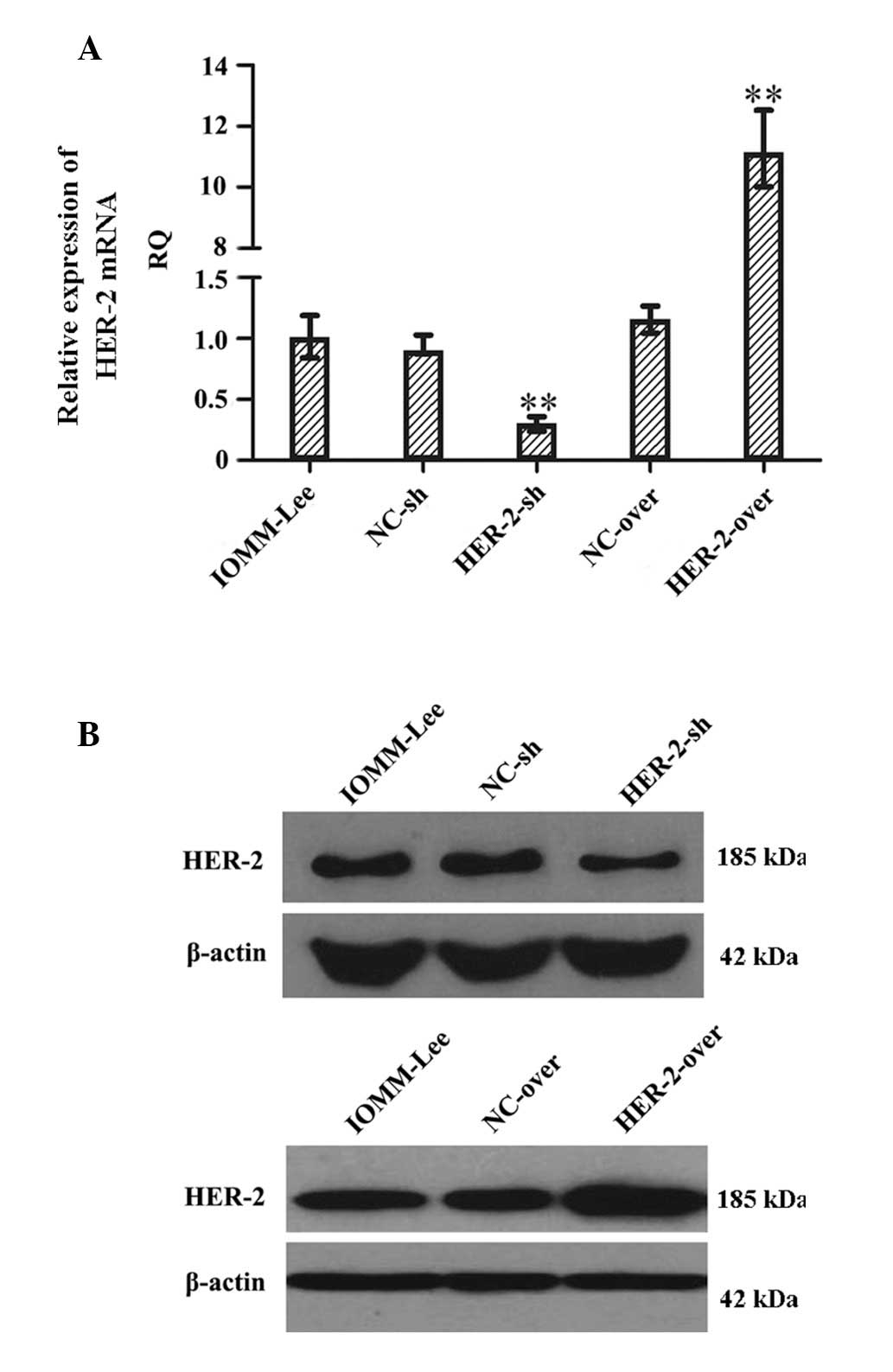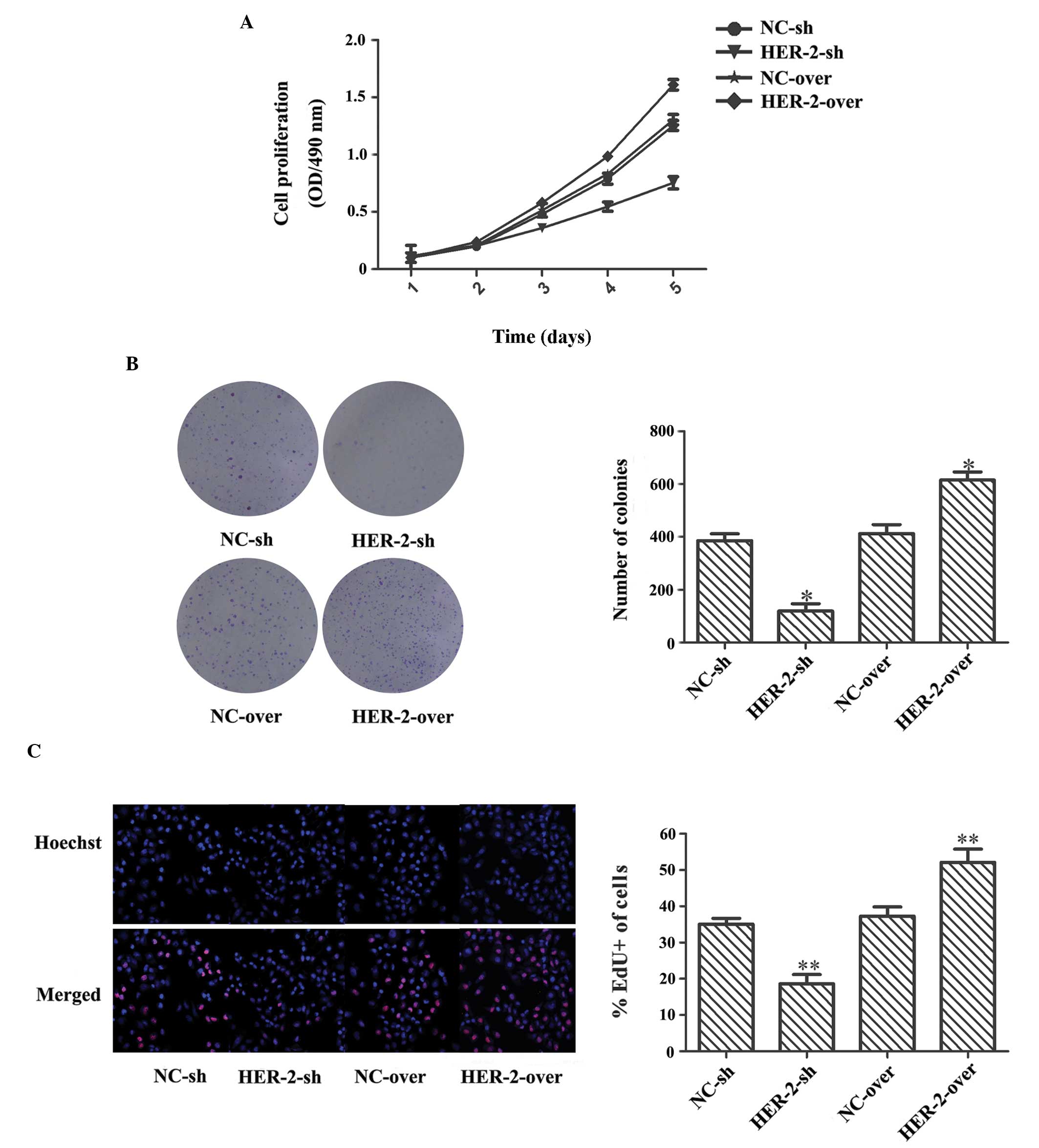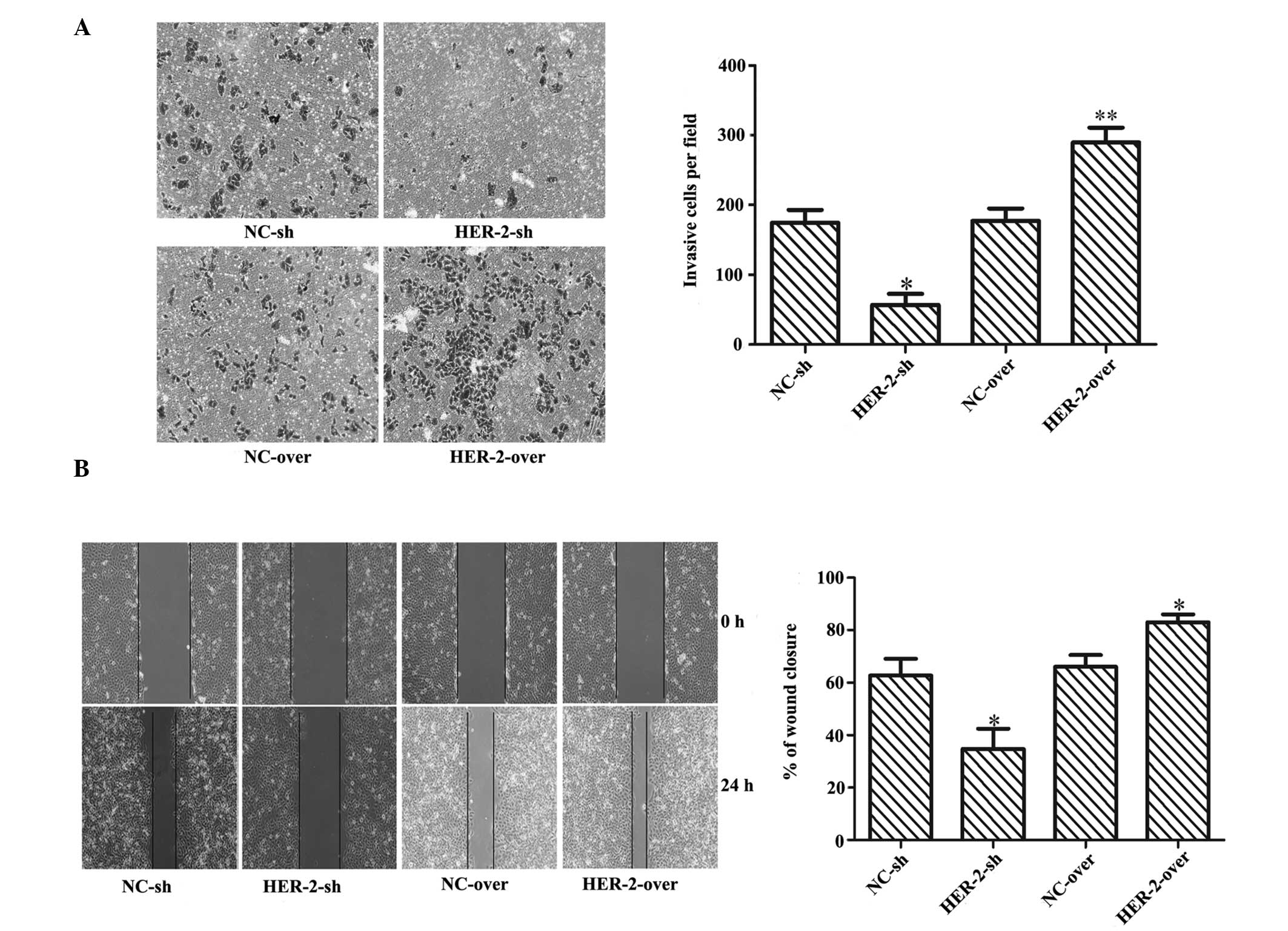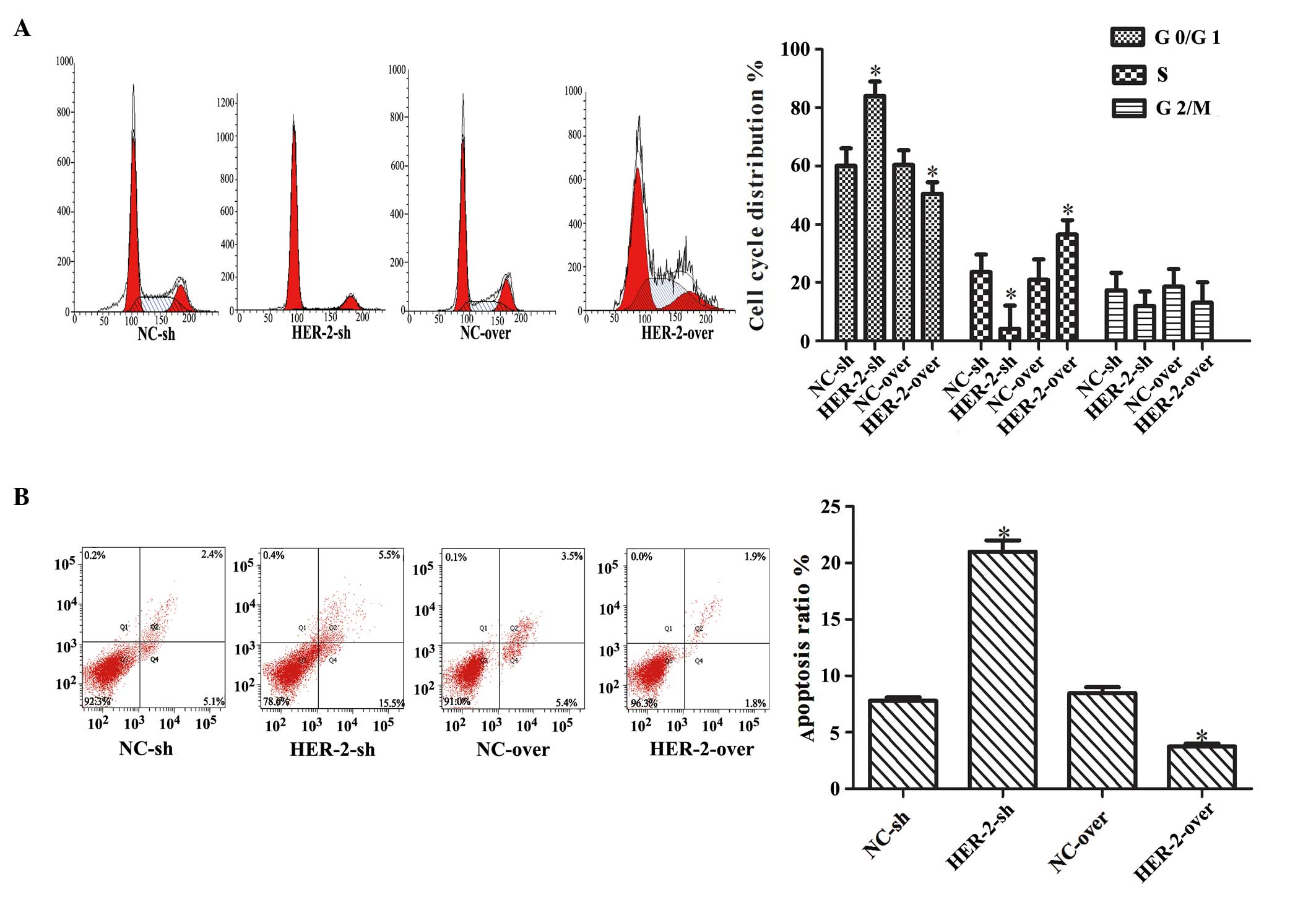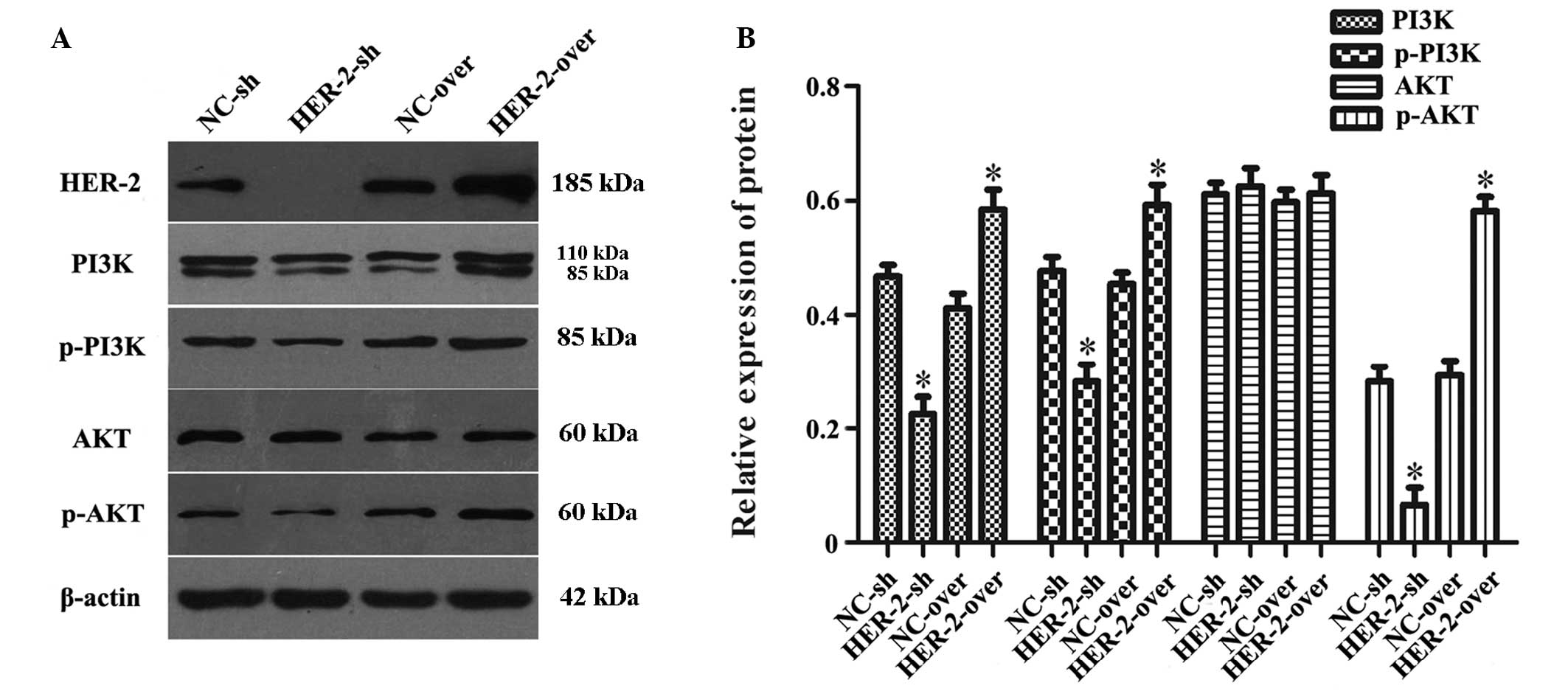|
1
|
Louis DN, Ohgaki H, Wiestler OD, et al:
The 2007 WHO classification of tumours of the central nervous
system. Acta Neuropathol. 114:97–109. 2007. View Article : Google Scholar : PubMed/NCBI
|
|
2
|
Chen L, Zou X, Wang Y, Mao Y and Zhou L:
Central nervous system tumors: a single center pathology review of
34, 140 cases over 60 years. BMC Clin Pathol. 13:142013. View Article : Google Scholar
|
|
3
|
Mawrin C and Perry A: Pathological
classification and molecular genetics of meningiomas. J Neurooncol.
99:379–391. 2010. View Article : Google Scholar : PubMed/NCBI
|
|
4
|
Andrae N, Kirches E, Hartig R, et al:
Sunitinib targets PDGF-receptor and Flt3 and reduces survival and
migration of human meningioma cells. Eur J Cancer. 48:1831–1841.
2012. View Article : Google Scholar : PubMed/NCBI
|
|
5
|
Vranic A: Antigen expression on recurrent
meningioma cells. Radiology and oncology. 44:107–112. 2010.
View Article : Google Scholar : PubMed/NCBI
|
|
6
|
Sahlberg KK, Hongisto V, Edgren H, et al:
The HER2 amplicon includes several genes required for the growth
and survival of HER2 positive breast cancer cells. Mol Oncol.
7:392–401. 2013. View Article : Google Scholar
|
|
7
|
Liu X, Zhang Y, Ren W and Rao G: ErbB2
gene silencing and its effect on PTEN in SACC-83 salivary adenoid
cystic carcinoma cells. Oncol Rep. 24:1291–1296. 2010.PubMed/NCBI
|
|
8
|
Way TD, Kao MC and Lin JK: Apigenin
induces apoptosis through proteasomal degradation of HER2/neu in
HER2/neu-overexpressing breast cancer cells via the
phosphatidylinositol 3-kinase/Akt-dependent pathway. J Biol Chem.
279:4479–4489. 2004. View Article : Google Scholar
|
|
9
|
Park HK, Kim IH, Kim J and Nam TJ:
Induction of apoptosis and the regulation of ErbB signaling by
laminarin in HT-29 human colon cancer cells. Int J Mol Med.
32:291–295. 2013.PubMed/NCBI
|
|
10
|
Paik S, Bryant J, Tan-Chiu E, et al: HER2
and choice of adjuvant chemotherapy for invasive breast cancer:
National Surgical Adjuvant Breast and Bowel Project Protocol B-15.
J Natl Cancer Inst. 92:1991–1998. 2000. View Article : Google Scholar : PubMed/NCBI
|
|
11
|
Pegram MD: Treating the HER2 pathway in
early and advanced breast cancer. Hematol Oncol Clin North Am.
27:751–765. 2013. View Article : Google Scholar : PubMed/NCBI
|
|
12
|
Di Cosimo S, Arpino G and Generali D:
Neoadjuvant treatment of HER2 and hormone-receptor positive breast
cancer-moving beyond pathological complete response. Breast.
23:188–192. 2014. View Article : Google Scholar : PubMed/NCBI
|
|
13
|
Ding H, Helguera G, Rodriguez JA, et al:
Polymalic acid nanobioconjugate for simultaneous immunostimulation
and inhibition of tumor growth in HER2/neu-positive breast cancer.
J Control Release. 171:322–329. 2013. View Article : Google Scholar : PubMed/NCBI
|
|
14
|
Boku N: HER2-positive gastric cancer.
Gastric Cancer. 17:1–12. 2014. View Article : Google Scholar :
|
|
15
|
Qi W, Li X, Zhang Y, et al: Overexpression
of Her-2 upregulates FoxM1 in gastric cancer. Int J Mol Med.
33:1531–1538. 2014.PubMed/NCBI
|
|
16
|
Jeung J, Patel R, Vila L, et al:
Quantitation of HER2/neu expression in primary gastroesophageal
adenocarcinomas using conventional light microscopy and
quantitative image analysis. Arch Pathol Lab Med. 136:610–617.
2012. View Article : Google Scholar : PubMed/NCBI
|
|
17
|
Chao WR, Lee MY, Lin WL, et al: HER2
amplification and overexpression are significantly correlated in
mucinous epithelial ovarian cancer. Hum Pathol. 45:810–816. 2014.
View Article : Google Scholar : PubMed/NCBI
|
|
18
|
Waage IS, Vreim I and Torp SH:
C-erbB2/HER2 in Human Gliomas, Medulloblastomas and Meningiomas: A
Minireview. Int J Surg Pathol. 21:573–582. 2013. View Article : Google Scholar : PubMed/NCBI
|
|
19
|
Mahzouni P and Movahedipour M: An
immunohistochemical study of HER2 expression in meningioma and its
correlation with tumor grade. Pathol Res Pract. 208:221–224. 2012.
View Article : Google Scholar : PubMed/NCBI
|
|
20
|
Loussouarn D, Brunon J, Avet-Loiseau H, et
al: Prognostic value of HER2 expression in meningiomas: an
immunohistochemical and fluorescence in situ hybridization study.
Hum Pathol. 37:415–421. 2006. View Article : Google Scholar : PubMed/NCBI
|
|
21
|
Abdelzaher E, El-Gendi SM, Yehya A and
Gowil AG: Recurrence of benign meningiomas: predictive value of
proliferative index, BCL2, p53, hormonal receptors and HER2
expression. Br J Neurosurg. 25:707–713. 2011. View Article : Google Scholar
|
|
22
|
Fu J, Tian C, Xing M, et al: KU004 induces
G1 cell cycle arrest in human breast cancer SKBR-3 cells by
modulating PI3K/Akt pathway. Biomed Pharmacother. 68:625–630. 2014.
View Article : Google Scholar : PubMed/NCBI
|
|
23
|
Khan S, Shukla S, Sinha S, Lakra AD, Bora
HK and Meeran SM: Centchroman suppresses breast cancer metastasis
by reversing epithelial-mesenchymal transition via downregulation
of HER2/ERK1/2/MMP-9 signaling. Int J Biochem Cell Biol. 58:1–16.
2015. View Article : Google Scholar
|
|
24
|
Wang CL, Mei JH, Wang SS, et al:
Expression of HER2/neu in meningiomas: an immunohistochemistry and
fluorescence in situ hybridization study. Zhonghua Bing Li Xue Za
Zhi. 39:156–160. 2010.In Chinese. PubMed/NCBI
|
|
25
|
Lin VC, Chou CH, Lin YC, et al: Osthole
suppresses fatty acid synthase expression in HER2-overexpressing
breast cancer cells through modulating Akt/mTOR pathway. J Agr Food
Chem. 58:4786–4793. 2010. View Article : Google Scholar
|
|
26
|
Kuo HP, Hsu SC, Ou CC, et al: Ganoderma
tsugae extract inhibits growth of HER2-overexpressing cancer cells
via modulation of HER2/PI3K/Akt signaling pathway. Evid Based
Complement Alternat Med. 2013:2194722013. View Article : Google Scholar : PubMed/NCBI
|
|
27
|
Roskoski R Jr: The ErbB/HER family of
protein-tyrosine kinases and cancer. Pharmacol Res. 79:34–74. 2014.
View Article : Google Scholar
|
|
28
|
Courtney KD, Corcoran RB and Engelman JA:
The PI3K pathway as drug target in human cancer. J Clin Oncol.
28:1075–1083. 2010. View Article : Google Scholar : PubMed/NCBI
|
|
29
|
Bartholomeusz C and Gonzalez-Angulo AM:
Targeting the PI3K signaling pathway in cancer therapy. Expert Opin
Ther Tar. 16:121–130. 2012. View Article : Google Scholar
|
|
30
|
Steelman LS, Stadelman KM, Chappell WH, et
al: Akt as a therapeutic target in cancer. Expert Opin Ther
Targets. 12:1139–1165. 2008. View Article : Google Scholar : PubMed/NCBI
|
|
31
|
Porta C, Paglino C and Mosca A: Targeting
PI3K/Akt/mTOR signaling in cancer. Front Oncol. 4:642014.
View Article : Google Scholar : PubMed/NCBI
|
|
32
|
Lauring J, Park BH and Wolff AC: The
Phosphoinositide-3-kina se-Akt-mTOR pathway as a therapeutic target
in breast cancer. J Natl Compr Canc Netw. 11:670–678.
2013.PubMed/NCBI
|
|
33
|
Briest F and Grabowski P:
PI3K-AKT-mTOR-signaling and beyond: the complex network in
gastroenteropancreatic neuroendocrine neoplasms. Theranostics.
4:336–365. 2014. View Article : Google Scholar : PubMed/NCBI
|
|
34
|
Jang YN and Baik EJ: JAK-STAT pathway and
myogenic differentiation. Jak-Stat. 2:e232822013. View Article : Google Scholar : PubMed/NCBI
|
|
35
|
Kavitha K, Kowshik J, Kishore TK, et al:
Astaxanthin inhibits NF-kappaB and Wnt/beta-catenin signaling
pathways via inactivation of Erk/MAPK and PI3K/Akt to induce
intrinsic apoptosis in a hamster model of oral cancer. Biochim
Biophys Acta. 1830:4433–4444. 2013. View Article : Google Scholar : PubMed/NCBI
|















